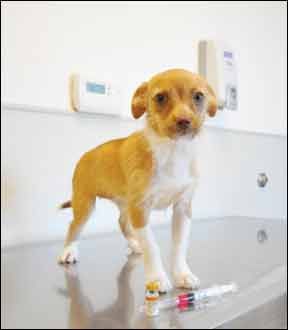A veterinarian’s first priority is the physical health of her clients. As a result, sadly, some veterinarians still issue the out-of-date edict to their puppy owners to not take their baby dog anywhere until he is fully vaccinated – age 4 to 6 months. This, of course, totally overlooks the very real concern for a pup’s mental health, and the vital need for proper socialization to occur well before the pup is fully vaccinated. As mentioned in the accompanying article, the primary socialization period is early and short – when the pup is 3 to 14 weeks of age. At 4 months, the earliest age a pup will have received all his first-year shots, the undersocialization damage is done, and the owner must now modify the fearful behavior that could have been avoided had her veterinarian given her better advice.

In fact, the need for the “puppy series” of vaccinations is widely misunderstood by many puppy owners. It’s not that your pup needs a series of shots to boost his immune system to a protective level. What actually happens is this:
When a puppy is born and begins to nurse, he drinks colostrum – milk produced during the first day or two after birth, that contains a high antibody count. By drinking colostrum, the pup gains an early level of immunities from his mother, which protects him until his own system can produce immunities.
At some point between the age of 8 and 16 weeks, the mother’s immunities start to fade. If given too soon, a vaccine is ineffective, because mom’s immunities are still at work. If vaccinated too late, the pup is unprotected for a while, because mom’s immunities are gone and the pup’s haven’t yet been triggered by the tardy vaccination. However, as long as a pup is vaccinated in a timely manner during the puppy series, he should be adequately protected, especially if the owner doesn’t foolishly expose him to very high risk environments such as dog parks, dogs or puppies known to be sick, or places sick canines are known to frequent.
The American Veterinary Society of Animal Behavior’s “Position Statement on Puppy Socialization” says: “In general, puppies can start puppy socialization classes as early as 7 to 8 weeks of age. Puppies should receive a minimum of one set of vaccines at least 7 days prior to the first class and a first deworming. They should be kept up-to-date on vaccines throughout the class.” It goes on to say, “In fact, behavioral problems are the number one cause of relinquishment to shelters. Behavioral issues, not infectious diseases, are the number one cause of death for dogs under three years of age.”
In other words, a pup is more likely to die from behavior problems – including fear and aggression often related to lack of socialization – than he is from getting sick at a puppy socialization or training class.






